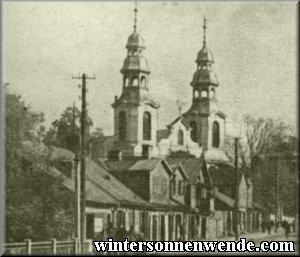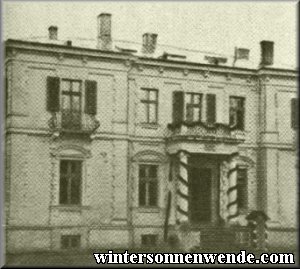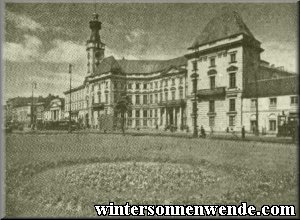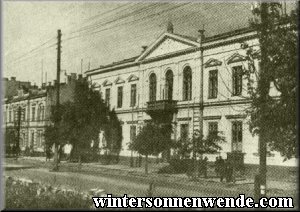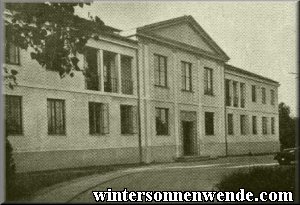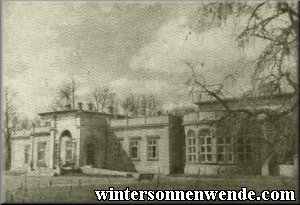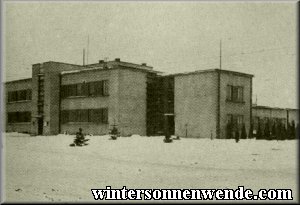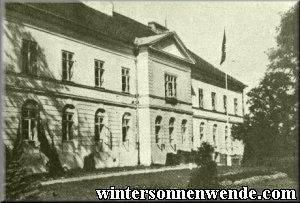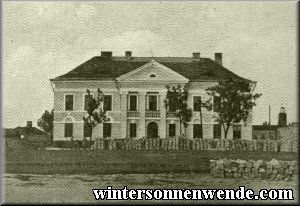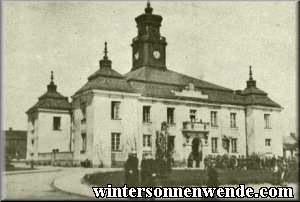 |
 Administrative Reconstruction and Development in Warsaw District (Part 2)
4. Development of the Municipal Administration of Warsaw
Under military administration, a Reich Commissioner was initially appointed for Warsaw. Charge of the city was then temporarily transferred to a city president. The Head of the District, Governor Dr. Fischer, then personally assumed administrative leadership and requested a "representative for the city of Warsaw". Thus, the Governor himself initially discharged the responsibilities of the City Administrator of Warsaw, and his "representative" had a deputy function. This arrangement ended in September 1941. Since that time, the administrative head of Warsaw has again been a City Administrator.1 In financial and budgetary respects, a sharp distinction has also been made in Warsaw between the City Administrator's governmental supervisory authority and the Polish municipal administration. The German City Administrator merely supervises the Polish city council, which in turn deals independently with all administrative matters insofar as the City Administrator does not pre-empt them due to their significance for German interests.
Considering the size of Warsaw, the number of officials employed by the city administration, and the immense volume of work needing to be done, any other administrative approach would be untenable, particularly as the greatest part by far of the work involved are matters of no great significance for German interests. Practice has shown that this method readily permits supervision of the most important matters by a relatively small number of German officials and employees. During the existence of the General Government to date, the administrative organization just described has made it possible to restore order in the city of Warsaw. It has also been possible to balance the budget, for which purpose, however, the rigorous cutback of expenditures was no less necessary than were substantial subsidies from the funds of the General Government. In this context it must also be mentioned that due to the great numbers of Jews living in Warsaw – some 500,000 Jews, comprising a third of the total population –, the administration of the Jewish residential areas2 required special regulations. The Representative of the Jewish Council was charged with mayoral responsibilities and authority for the Jewish residential section of Warsaw. This Representative of the Jewish Council is subordinate to the Commissioner for the Jewish residential section, who in turn is appointed directly by the Governor. A transfer point, constituted as a public institution, has been created to facilitate the regulation of the Jewish quarter's business relations with the outside world. The administrative modes here discussed are unprecedented in every way and have had to be created from scratch, as it were, to meet the requirements of the present situation, for which there were no prior models to draw on. The creative initiative of everyone involved was of utmost importance in this. In the comprehensive report which the Governor-General drew up on the occasion of the General Government's second anniversary, he rightly pointed this out, and proudly noted that the first rough draft of this governmental organization, first sketched late in 1939, has since been successfully consolidated into a solid administrative construct which has enabled this "war baby", the General Government, to become a powerful instrument of law and order within a very short period of time.
 5. The County Administrator
In light of what is thus involved in the sum of the administrative functions for such a region, the County and City Administrators have the corresponding right and duty to give orders and to take action in any case where the interests of the Reich require it. Former Polish law has essentially remained in effect, but is invalid in those respects in which it contradicts the administrative takeover by the German Reich. The Governor-General and his government have issued official orders regarding a wide range of situations and matters; there are, however, still many areas which are not yet regulated by appropriate legal prescriptions. Furthermore, at times the orders provide only a general direction rather than a detailed regulation. For this reason, the County Administrator frequently has to carry out measures and orders on his own responsibility in such a way as is in keeping with the political guidelines issued by the Governor-General or with the goals expressed by his measures. Great demands are therefore made on the initiative and the willingness of the Administrator and his staff to take responsibility. At the same time, however, this gives free rein to the creative initiative of the lowest administrative level, to a degree which is not the case in comparable administrations within the Reich. It is gratifying to see how fully the County and City Administrators have made use of this in their administrative activities to date, and have frequently tackled and solved problems on their own judgement. Their initiative and energy have on occasion given their superiors new ideas, so that many a measure initially taken by only a single County Administrator has since been generally applied. The setting-up of closed Jewish residential sections, for example, was effected for the first time in May of 1940 in a county precinct in the western region of the District. The experiences gained in the process contributed to the setting-up of Jewish residential sections throughout the entire General Government. Despite adherence to all requirements, the manner of work at this level is refreshingly unbureaucratic. There is a complete absence of any petty restrictions and checks, as the numerically small German personnel could not fulfill all of the tasks which arise in any but a liberal manner not restricted by intricate specifications of execution. It has thus often been the case that important orders to be passed on to the community bailiffs were conveyed verbally only. A single verbal order has frequently sufficed to achieve far-reaching results. Very often, the decrees and orders which the County or City Administrator issues, or must carry out, address the Polish population or parts thereof, and require certain manners of conduct or specific actions. The landowners and peasants, for example, are required to turn in certain annual quotas of produce, livestock and grain to the collection stations set up for the purpose; owners of haulage businesses must render certain haulage services; traders are required to sell their goods and products only through the controlled wholesale and retail framework; grocery stores are permitted to distribute their wares only in return for food ration cards, and only in the prescribed quantities; anyone able to work must comply with the orders of the Division of Labor to carry out work assigned to them. As previously indicated, the Polish people cannot be expected to participate actively and happily in the carrying-out of these measures. However, it is necessary that the people fulfill their obligations and heed the interdicts issued. What is required, therefore, is that the people be extensively and thoroughly informed and educated. Such instruction must cover not only political events and the course of the war, but must also explain in a convincing manner the necessity for the measures imposed by the German administration. This instruction, effected by the press and in the Polish language, does not in and of itself suffice as administrative support, as the Polish smallholder hardly ever picks up a newspaper and a large proportion of the Polish people are illiterate. In conjunction with the Division of Propaganda, therefore, the County (or City) Administrators have installed loudspeakers in the market squares of the larger towns and cities, and in this way news programs as well as other important announcements are regularly broadcast in the Polish language. Moreover, some precincts make use of loudspeaker vans. The people show a lively interest in these news programs and gather regularly in the market squares at broadcast time. Further, the most important decrees and orders are brought to immediate public attention by means of posters. News posters are displayed in even the smallest villages and contribute a great deal to bringing the news in question to the attention of all literate peasants. Every measure affecting the private and economic life of the individual has been announced in this way.
In order to create understanding for the measures introduced, regular discussion meetings with the mayors and bailiffs are held in which the orders given for many different administrative areas are regularly made public. The bailiffs then in turn meet with the village mayors and pass on what they have learned. Every now and then, meetings of village mayors also take place under the County Administrator's direction. As a result of this informational campaign, the most important orders have been made known to all parts of the population and there has been a marked increase in understanding for the German measures. In many matters the people now increasingly comply voluntarily with the German orders. But as there are malicious elements everywhere which tend to regard as enemy acts even steps taken in the interest of the people, it is necessary to get these elements to observe and comply with the given orders by means of administrative penalties or coercion. For the sake of preserving German authority, even minor cases of insubordination cannot be tolerated. Therefore all decrees take the form of a clear and unequivocal order which determines the implementation of a measure in every detail and which can be enforced against the wilfully malicious through penal institutions if necessary. On the basis of the Governor-General's decree regarding administrative criminal proceedings, the County Administrators are in a position to impose simple administrative penalties for noncompliance with one of their orders. Of this authority to impose penalties, use is made as required; however, such cases are the exception to the rule and are usually reported by the village mayors and bailiffs to the County Administrator for discipline. Particularly malicious elements are temporarily committed for correctional purposes to a labor camp. There, the inmates are obliged to physical labor – a measure which, in light of the Polish people's characteristic inclination to idleness, has been extraordinarily successful in backing any given order with the required emphasis. All in all, the work of the County Administrators has produced excellent results. The further administrative consolidation of the county precincts is thus an absolute necessity for the general German interest.
 1As of September 15, 1941, the City Administrator of Warsaw has been SA Colonel Leist, who previously (since March 16, 1940) had already been the "Representative of the District Head for the City of Warsaw"....back...
2Cf. Section IV.2: "The Jews in the District of Warsaw".
...back...
|





